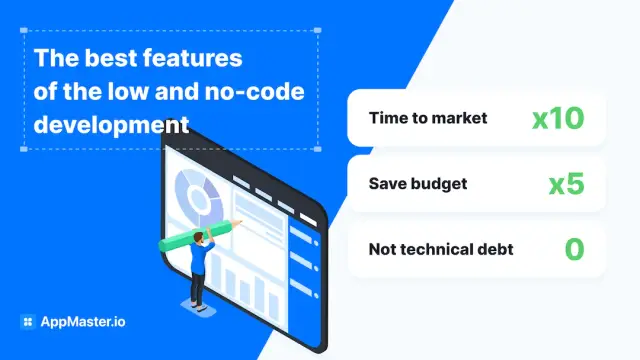The Benefits of Using No-Code Platforms for HIPAA-Compliant Software
Discover how no-code platforms can simplify the creation of HIPAA-compliant software solutions, reducing development time, costs, and the risk of falling short of stringent regulations.

HIPAA and Software Development Challenges
The Health Insurance Portability and Accountability Act (HIPAA) is a US federal law that sets standards for the privacy and security of protected health information (PHI). As medical practices, hospitals, and other organizations involved in the healthcare industry become more digitized, the need for secure, HIPAA-compliant software solutions increases significantly.
Healthcare software must follow strict regulations to ensure the privacy and security of electronic PHI and prevent data breaches or unauthorized access. Developing HIPAA-compliant software still can pose challenges for developers and organizations alike. They must navigate a complex sphere of regulatory requirements and cybersecurity threats while designing software that adheres to HIPAA's Privacy and Security Rules.
Healthcare software solutions must provide extended functionality, seamless performance, and excellent user experience and always protect sensitive health information. Here is where no-code platforms step into the scene.
No-Code Platforms: Overview and Key Benefits
No-code platforms allow users to build applications without traditional coding, significantly reducing the time and resources required for development. These platforms provide a visual interface for constructing software, enabling rapid prototyping, iteration, and deployment of applications. Some key benefits of using no-code platforms include:
- Lower development costs: By eliminating the need for hiring developers or development teams, no-code platforms can reduce the cost of creating and maintaining software solutions.
- Faster time to market: The visual nature of no-code development enables rapid prototyping and faster adjustments, allowing organizations to bring their solutions to market more quickly.
- User-friendly interface: No-code platforms make it easier for non-technical individuals, such as business leaders, healthcare professionals, or citizen developers, to create fully functional applications without relying on programming expertise.
- Scalability and flexibility: With no-code platforms, businesses can quickly adapt their applications to changing needs and requirements, ensuring that solutions remain relevant and effective as organizations grow and evolve.
- Reduced technical debt: Because no-code solutions can generate applications from scratch, organizations can avoid the technical debt often associated with modifying existing software.

Creating HIPAA-Compliant Software with No-Code Platforms
No-code platforms can simplify the development of HIPAA-compliant software solutions by offering pre-configured templates, components, and workflows to meet the stringent requirements of HIPAA regulations. When selecting a suitable no-code platform for creating healthcare software, it is crucial to ensure that it boasts features and capabilities that align with HIPAA's Privacy and Security Rules. These may include:
Data encryption
PHI must be encrypted in transit and at rest to prevent unauthorized access or breaches. No-code platforms should offer out-of-the-box encryption options that ensure the security of data.
Auditing and monitoring
HIPAA-compliant applications require strong auditing and monitoring capabilities to track user access and interactions with PHI. No-code platforms should support this level of tracking and offer reporting features for compliance purposes.
Access control
Implementing role-based access control (RBAC) within healthcare software ensures that only authorized individuals can access and interact with PHI. No-code platforms should facilitate the easy creation of user roles and access restrictions to support this requirement.
Integration with existing systems
Many healthcare organizations rely on existing systems for managing PHI and other data. The chosen no-code platform should allow for seamless integration with these systems to consolidate information and ensure that all data remains secure and compliant.
To create a HIPAA-compliant software solution effectively and efficiently, selecting a no-code platform that provides the appropriate features, templates, and capabilities designed to meet the healthcare industry's unique challenges and regulatory requirements is essential. By harnessing the power of no-code development, healthcare organizations can significantly reduce costs, development time, and the risk of falling short of HIPAA regulations, resulting in reliable, secure, and user-friendly software solutions.
Case Study: A HIPAA-Compliant Telemedicine App
Telemedicine applications play a crucial role in modern healthcare by providing remote patient care, improving access to medical services, and reducing healthcare costs. Yet, developing a telemedicine application compliant with stringent HIPAA regulations can be complex and time-consuming. Let us dive into a case study to illustrate how no-code platforms can, in fact, simplify the development of a HIPAA-compliant telemedicine app.
Suppose a healthcare organization wants to create a telemedicine application targeting patients and providers. The app's features would include video consultations, appointment scheduling, prescription management, secure messaging, and electronic health record (EHR) integration. Building this application from scratch while ensuring it adheres to HIPAA's Privacy and Security Rules poses several challenges for software developers:
- Complexity of requirements analysis and software design
- Striking a balance between user-friendly interfaces and secure components
- Implementing secure encryption methods for data storage and transmission
- Developing auditing and user access control mechanisms
- Maintaining compliance with evolving regulations and security standards

Using a no-code platform to develop this telemedicine application can effectively address these challenges. With a no-code approach, the healthcare organization can create a fully functioning, HIPAA-compliant solution much more quickly and affordably. The advantages of using a no-code platform in this case include:
- Drag-and-drop functionality that simplifies application design
- Pre-defined templates, workflows, and components that align with HIPAA requirements
- Built-in security features, such as encryption, and user role management
- Automatic updates, ensuring compliance with changing regulations
- Integration with existing EHR systems and other tools
- Reduced development costs, as well as ongoing maintenance expenses
How AppMaster Can Simplify HIPAA-Compliant Development
AppMaster is a no-code platform that simplifies the development of backend, web, and mobile applications for various industries, including healthcare. Creating HIPAA-compliant software is made much easier through AppMaster's powerful drag-and-drop interface and powerful backend system. AppMaster can support the development of healthcare solutions in several ways:
- Visual Application Creation: With AppMaster's drag-and-drop interface, you can create complex application interfaces without writing a single line of code. This helps speed up application design and ensures accurate application components representation during the planning phase.
- Built-in Security Features: AppMaster provides built-in security features that ensure electronic PHI confidentiality, integrity, and availability. By using AppMaster, you can implement data encryption, audit logging, and user role management, aligning your application with HIPAA requirements.
- Pre-defined Templates and Workflows: AppMaster offers pre-built templates and workflows that can help streamline the development of healthcare applications, including telemedicine solutions. You can readily adapt these templates to your project requirements while adhering to the regulatory standards.
- Integration with Existing Systems: With AppMaster, you can easily integrate your healthcare application with existing systems, such as EHR software. By facilitating data exchange between these systems, you can provide a seamless user experience while ensuring compliance with HIPAA standards.
- Automatic Updates: AppMaster ensures compliance with changing regulations by providing automatic updates and maintenance. This means the platform remains current with the latest security and regulatory requirements, providing peace of mind to healthcare organizations.
- Access to the Source Code: AppMaster significantly simplifies HIPAA-compliant development through its specialized offerings under the Enterprise subscription plan. This subscription plan gives customers access to their applications' source code, granting them the flexibility to host and manage these applications on their infrastructure. This level of access proves instrumental in achieving HIPAA compliance, especially concerning Electronic Health Record (EHR) integration.
AppMaster is an ideal solution for healthcare organizations seeking to develop HIPAA-compliant software while significantly reducing development time and costs.
Future Trends in No-Code Development for Healthcare
The future of no-code healthcare development holds promising trends poised to transform the industry. One key trend is the increasing adoption of no-code platforms to empower healthcare professionals with tools for rapid application development. As these platforms evolve, they are likely to incorporate specialized modules and templates tailored for healthcare scenarios, enabling the creation of custom applications without the need for extensive coding expertise.
Integration capabilities are expected to play a pivotal role in the future of no-code development for healthcare. No-code platforms that seamlessly integrate with existing electronic health record (EHR) systems, medical databases, and IoT devices will become indispensable. This integration prowess will enable healthcare organizations to build comprehensive, interoperable solutions that streamline workflows and enhance patient care.
The democratization of app development within healthcare settings is another anticipated trend. No-code platforms will empower a broader spectrum of healthcare professionals, including clinicians and administrators, to actively participate in creating and customizing applications tailored to their specific needs. This shift could lead to a more agile and responsive healthcare IT ecosystem.
Furthermore, the future will likely witness advancements in AI-driven functionalities within no-code platforms. Incorporating machine learning algorithms and natural language processing capabilities into these platforms can facilitate the development of intelligent healthcare applications. These applications could assist in data analysis, diagnosis, and personalized patient care, marking a significant stride toward integrating advanced technologies in healthcare through a no-code approach.
The future trends in no-code development for healthcare point toward increased accessibility, integration capabilities, and the infusion of artificial intelligence. These advancements are set to redefine how healthcare applications are created, fostering innovation, and improving the efficiency and quality of healthcare services.
Conclusion
Developing HIPAA-compliant healthcare software can be a daunting task due to stringent regulations and the need for powerful security features to safeguard sensitive data. No-code platforms like AppMaster provide a straightforward and cost-effective alternative to traditional development methods. By utilizing drag-and-drop interfaces, built-in security mechanisms, and pre-defined templates and workflows, these platforms can accelerate the development of HIPAA-compliant solutions, lowering costs and reducing the risk of non-compliance. Moreover, AppMaster users can access their applications' source code, empowering them to host and manage the applications on their own infrastructure.
Whether creating telemedicine apps, electronic health records, or other healthcare-related solutions, no-code platforms provide healthcare organizations with an efficient and agile way to respond to industry regulations and evolve with the ever-changing healthcare technology sphere.
FAQ
HIPAA stands for the Health Insurance Portability and Accountability Act. It is a US federal law that sets standards for the privacy and security of protected health information (PHI). Healthcare providers and organizations handling PHI must comply with HIPAA regulations to ensure the confidentiality, integrity, and availability of electronic PHI.
Healthcare software that handles PHI must be HIPAA-compliant to protect patients' sensitive health information from unauthorized access, misuse, or breaches. Non-compliance can result in severe penalties, including fines, damaged reputation, and loss of consumer trust.
Developers must navigate a complex landscape of regulatory requirements and cybersecurity threats while building HIPAA-compliant software. They need to design software that adheres to HIPAA's Privacy and Security Rules, ensuring the protection of electronic PHI while also meeting industry standards for functionality, performance, and user experience.
No-code platforms allow users to build applications without traditional coding. They can simplify the creation of HIPAA-compliant software by offering pre-built templates, components, and workflows, while maintaining security measures such as encryption, auditing, and access control. This can help reduce development time, cost, and the risk of falling short of stringent HIPAA regulations.
AppMaster is a powerful no-code platform that allows users to create backend, web, and mobile applications for various industries, including healthcare. The platform enables users to build HIPAA-compliant solutions by offering built-in security features, user role management, and easy integration with existing systems. This helps healthcare organizations meet regulatory requirements while accelerating the development process.
Yes, you can build a HIPAA-compliant telemedicine application using a no-code platform such as AppMaster. No-code solutions can provide the necessary security features and support the creation of user-friendly interfaces that meet regulatory standards while significantly reducing development time and cost.





